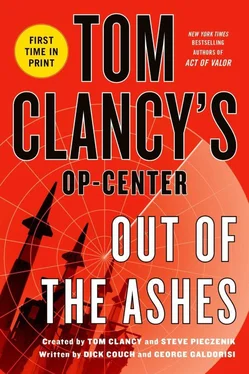This thievery is not only contrary to Islamic law, but it is an affront to the peaceful people of the Islamic Republic of Iran. The Islamic Republic has no recourse but to state that until this criminal activity ceases, not one barrel of any nation’s oil will leave the Arabian Gulf. Furthermore Iraq must acknowledge its illegal acts and compensate the Islamic Republic of Iran for the stolen oil.
Any attempt to stop the Islamic Republic of Iran from preventing this wanton thievery will be met by appropriate force.
Prince Ali al-Wandi trusted his chief engineer above all others, but he wanted to see the operation for himself. He was pleased when it took him and his pilot a second look from only two miles away to find the mostly obscured blockhouse. Once the S-92 helicopter landed and the prince got out, Jawad Makhdoom was outside to great him. The prince waved his helicopter away. “Come inside quickly,” he said to the chief engineer. “We don’t know what other prying eyes the Americans have.”
Once inside, Prince Ali looked at the large audio apparatus and computer monitor they had set up. “So you have been alternating these communications as we discussed,” the prince began.
“Yes, I have. We have six tapes and I have been playing them according to this schedule,” Makhdoom replied, moving his mouse and clicking an Excel spreadsheet on his computer desktop. “We are running the conversations you had taped that sound like Syrian army officers and other officials talking about making these missiles ready for launch. We are broadcasting this on the frequencies you gave us, the ones you said the Syrian military uses for high-level communications.”
Al-Wandi knew Makhdoom wasn’t questioning his judgment, but just needed reassurance. “Yes, it wasn’t difficult to get those frequencies or the kind of jargon their military uses. After all, you know how many of their military went over to the rebel side during their civil war. Even soldiers need to feed their families.”
“I understand, Your Excellency. Listening to them myself they sound convincing. It sounds like Syria has multiple DF-21D sites throughout their desert and a command center somewhere else, probably in Damascus, that is trying to coordinate between all the sites so when they launch the missiles, they make a coordinated attack against the American aircraft carrier.”
“You listen well, my friend. So tell me, what are the communications saying as to why they haven’t attacked already?”
“It appears the Syrians are having technical issues at several of their sites and the people in the command center are angry about it. In several cases they talk about sending technicians to the sites to fix things.”
“Good. You are hearing just what we want the Americans to hear. Yet still no action from them yet?”
“They may be taking action, but we just might not know about it yet,” Makhdoom said, trying to reassure his boss.
“You may be right. But we need to get them to move faster. Here, here are two more tapes I want you to load up, put in the queue, and start playing.”
* * *
“Mr. President, thank you for seeing me on such short notice,” Jack Bradt said as he entered the Oval Office. “Trevor,” he continued, acknowledging the national security advisor.
“No, Jack, thank you for staying on top of all this. We’ve got a hell of a mess in the Gulf, don’t we?”
“Mr. President, we’ve now basically got a two-front crisis. I think we need to move and move quickly.”
“All right. I’ve been getting information from Trevor’s National Security Staff throughout the day, so pull it all together for us from your perspective, would you?”
“Certainly, Mr. President. Now that we’ve got the three-letter agencies focused intently on Syria we’re getting more and more communications intercepts. Syria, or groups working from Syrian territory, is talking about doing a coordinated DF-21D strike on U.S. assets in the area. We’re giving General Albin all the overhead assets we can as fast as we can, but … well, Mr. President, Syria is bigger than Florida, and you know how big your home state is. That’s a hell of a lot of ground to cover.”
“No, I get it.”
“And now we’ve gotten this message from the Islamic Republic News Agency about stopping the flow of oil out of the Gulf.”
“And we think they’re serious?” the president asked.
“We do, but not for the reasons they state. Iraq’s not stealing their oil, that’s just a ruse they’re using, a similar one to one they’ve tried before. We know Syria’s leader traveled to Iran and that Iran is desperate to prop up their one remaining friend in the Gulf.”
“So this is a threat against us, to prevent us from doing anything to Syria?”
“That’s our consensus assessment, Mr. President. It kind of is in line with what one of our Central Command commanders, General Mattis, said back in 2013.”
“Oh, you mean his Senate testimony?” Harward asked.
“Yes. He told the Senate the collapse of the Assad regime would be the biggest strategic setback for Iran in twenty-five years. That got a lot of people’s attention. Yet it’s as true today as it was then. Regardless of who’s running Syria, Iran needs that government to be aligned with them, maybe more so now than they ever have.”
“So they’ll do what they need to do to keep us from moving against Syria?”
“In a nutshell, yes, Mr. President. If we look at just how Iran might do this, the only logical conclusion is they’d do it by mining the Strait of Hormuz. They don’t have the naval assets to seriously threaten oil tankers transiting the Gulf, not with as many ships as we have there to provide tanker escort.”
“So what are you and the Joint Chiefs suggesting we do?”
“Mr. President, we need to move against Syria and this missile threat, and soon. Once that’s done, we need to turn our attention to Iran. If they mine the Strait of Hormuz we know how to sweep those mines. We’ve got to put our mine-countermeasures forces, our Navy MCM folks in Bahrain, on alert now. We also need to get additional MCM helos moving from Norfolk because it will take them a week to get there, and we need to bring other assets to bear to protect the minesweeping forces while they do their job.”
“All right, Jack. I understand it’s not a simple operation. Then what’s our next step?”
“I’d like to get the Joint Chiefs over here to the Situation Room as soon as possible to lay it all out for you and Mr. Harward. However, above all else, I need to emphasize the need for us to move quickly.”
USS Normandy , Southern Arabian Gulf
(March 21, 0930 Arabia Standard Time)
Laurie had slept fitfully the night before, trying to convince herself that there was some other way. She had yet to think of one. She and Sandee had been back in their stateroom for only a few minutes following their workout, when Laurie decided to ask her friend for help.
“Boy, that feels a whole lot better, doesn’t it?” Sandee asked.
“Yeah, guess if there’s any upside to you all not flying, it’s that the flight deck is always open for running.”
“Small upside,” Sandee replied, smiling. “But, hey, that changes tomorrow, finally! That part for Mustin ’s radar arrives in Bahrain later today, and they want us to fly in and get it. Mustin ’s helo is down so we have to make the delivery.”
“I know, I heard folks talking about it in CDC.” Now or never, Laurie thought. “Sandee, you were a good friend to listen to me yesterday. Sorry to come apart like that; it’s really not like me. God, I’m a little embarrassed I was sobbing like that.”
Читать дальше












